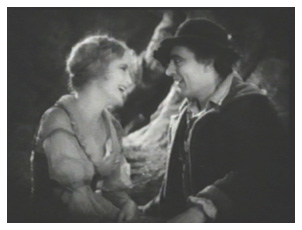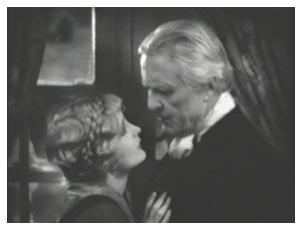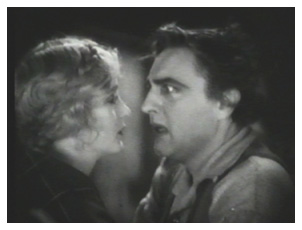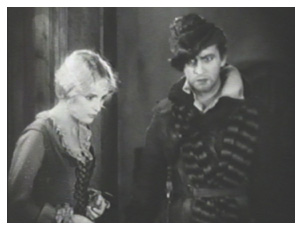

Warner Brothers
Directed by Ernst Lubitsch
CAST: John Barrymore (Marcus Paltram), Camilla Horn (Ciglia),
Victor Varconi (Lorenz Gruber), Hobart Bosworth (Reverend Tass),
Mona Rico (Pia), Bodil Rosing (housekeeper), Evelyn Selbie (Pia's
mother)
"Eternal Love is a waste of great acting talent . . . the film simply is not worthy of the time and effort that would be required. It ranks as John Barrymore's very worst film, as well as one of the worst films of the entire silent era," said author Robert K. Klepper. (1).
Well, to each his own! Actually I like this film. I don't care for the ending, but, then again, I've always figured that an author who has all the main characters die at the end must have written himself (or herself) in a corner and couldn't figure how to get out of it. Must be the case here. But make no mistake - you'll get wrapped up in the joy of Marcus and Ciglia's love, the unfortunate twist of Fate that pulls them apart, and the frustration of convention that keeps them apart. So, the way I see it, "Eternal Love" is one of those films where you'll enjoy the journey - but you'll likely be disappointed when you reach the destination.
The setting (a quaint little village in the Swiss Alps)
is not that important, but it does make for great visuals - and
the cinematography and sets are well above par. What's more important
is the love story - could be why they named it "Eternal Love"
- ya think? Anyway, it takes place around 1806 in a small village
in Switzerland - Contresina, if it matters. John Barrymore is
somewhat of a  loner-outcast-rogue
spirit who likes to spend his time on the rocky ledges of the
Alps hunting. A hoyden named Pia (Mona Rico) constantly chases
after him and swears she will make him hers one day. He is disgusted
with her intrusive and persistent advances. This is abundantly
evidently when he pushes her away angrily and then spits after
she has kissed him. There's another good reason for his lack of
interest in Pia - he's in love with the Reverend's niece, the
beautiful Ciglia (Camilla Horn). Ciglia loves him, too, although
the Reverend isn't too fond of Marcus' wild spirit. Instead, Reverend
Tass (Hobart Bosworth) prefers the rather bland Lorenz Gruber
(Victor Varconi) who continues to court Ciglia and - unsuccessfully
- beg her to marry him.
loner-outcast-rogue
spirit who likes to spend his time on the rocky ledges of the
Alps hunting. A hoyden named Pia (Mona Rico) constantly chases
after him and swears she will make him hers one day. He is disgusted
with her intrusive and persistent advances. This is abundantly
evidently when he pushes her away angrily and then spits after
she has kissed him. There's another good reason for his lack of
interest in Pia - he's in love with the Reverend's niece, the
beautiful Ciglia (Camilla Horn). Ciglia loves him, too, although
the Reverend isn't too fond of Marcus' wild spirit. Instead, Reverend
Tass (Hobart Bosworth) prefers the rather bland Lorenz Gruber
(Victor Varconi) who continues to court Ciglia and - unsuccessfully
- beg her to marry him.
There is a big celebration in the village when the warring between the French and Austrians comes to an end (Switzerland was caught in the middle and occupied by the French). Ciglia and Marcus are enjoying the festivities, but Ciglia becomes perturbed with Marcus when he has had too much to drink and his advances are a little too presumptuous. She asks to be taken home. Angered at being rebuffed. Marcus goes home to his cabin and - to his surprise - finds Pia in his bedroom. Rather than kick her out, the camera remains on his face as he stares at her (out of camera range) . . . and the scene fades.
When he awakes the next morning, he cannot find Pia and is unsure of his inebriated actions from the night before. It doesn't matter, Pia and her mother have told the Reverend Tass all the details, and, so, of course, Marcus must marry Pia. Distraught, Ciglia reluctantly agrees to marry Lorenz.
Let's keep in mind that this was directed by Ernst Lubitsch - the guiding hand on such wonderful silent films as "The Marriage Circle" (1924), "Lady Windermere's Fan" (1926), "So This is Paris" (1926) and "The Student Prince in Old Heidelberg" (1927). Admittedly, the story isn't as good as the aforementioned films, but one can see a few instances of Lubitsch's genius. By the way, Hans Kraly adapted the scenario from a novel by Swiss author Jacob Christopher Heer - and Kraly is credited with the scenarios for both "So This is Paris" and "A Student Prince" mentioned above. With the mix of Lubitsch, Kraly, Barrymore, Horn, and a quality production by Warner Brothers (more on this later) - the combination is there for a more interesting film than is portrayed by the opening quote in this commentary.
Back to Lubitsch - here are a couple of "touches" in the film that are no doubt a credit to this talented director. Pia has tracked Marcus down while he is hunting in the mountains. Trying several times to force herself on him unsuccessfully, she finally grabs him and kisses him as she runs away. He is disgusted with her and leaves for home. We later see him walk up the hill to his cabin. From a long shot, we see him open the door and go in. But the camera doesn't move and the scene doesn't fade. Then suddenly, the door opens and we see an arm literally throw Pia out the door and then slam. The scene fades as she fumes and rants at her treatment. A humorous "touch" by Lubitsch that has the same feel as if one had come home and found an unwanted animal in the home, so it is tossed out the door. A great bit of subtle humor!
Another favorite touch takes place the night of the celebration.
All are in costumes and wearing masks. When Marcus finds Ciglia,
he takes his crown off and places it on her head - an indication
of how much he reveres her. However, in the carriage on the way
home, the inebriated Marcus tries to become more sexual than Ciglia
feels is appropriate. Amidst the grappling, the crown falls to
the  floor - and Lubitsch is careful
to provide a very close-up shot of the crown on the floor of the
carriage. What a great metaphor for how she feels at that time
compared to his gentlemanly ways when he was not inebriated.
floor - and Lubitsch is careful
to provide a very close-up shot of the crown on the floor of the
carriage. What a great metaphor for how she feels at that time
compared to his gentlemanly ways when he was not inebriated.
For whatever failings there are in the story, let's make
sure we point out that this story succeeds with strong emotion
and intensity. We've established the story line so far:
- Pia chases Marcus and swears to win him
- Marcus loves Ciglia; despises Pia
- Pia finds her way into Marcus' cabin and takes advantage of
his inebriation and anger at being rebuffed by Ciglia
- Pia and her mother tell Reverend Tass (Ciglia's uncle with whom
she lives) the whole story
- Marcus is forced to marry Pia
- Hurt and with all hope gone of ever having a life with Marcus,
she marries Lorenz
OK, so that's where we are. Now, the story goes into second gear with more emotion and intensity. Ciglia seems to have resigned herself to life with Lorenz - even showing obvious appreciation for his kindness in one tender scene (this is important to the story). However, one stormy night, Pia is beside herself because Marcus is caught in the mountains - winds howling and snow blowing heavily. She runs to several men in the village asking them to form a search party, but none will venture out in this storm. She finally goes to Lorenz's home where we see him and Ciglia happy and at peace in their comfortable surroundings -- apparently oblivious to the raging storm outside. Suddenly, a knock at the door - Lorenz lets Pia in and hears her plea. He hurriedly shoves her back out the door worried at the fear and concern he sees on Ciglia's face. Realizing her reaction has betrayed her feelings for Marcus, she goes in the other room. He is now very aware that Ciglia's love for Marcus has not faded. He walks slowly, shoulders bent, into the next room. He sits down, places his arm on the table and then - as if in utter despair - lays his face on his arm. Unable to hold back her emotions, Ciglia comes over to him. "You can't sit here and let him die! Do something!" she pleads. Lorenz angrily slams his fist down on the table. "I'll not lift a hand. Let him die!" - and he goes in the other room.
Hang in there - I told you the story is picking up speed.
Ciglia grabs her wrap and goes out the door. It is not clear where she is going, but, when Lorenz realizes she has left, he goes to find her. As she is walking through the snowy, wind-blown night, there is Marcus, gun in hand, prey across his shoulder, looking at her sternly. Relieved, she walks up to him, takes his hand in hers and squeezes it - then, without saying anything, walks on. Lorenz sees this, and when Marcus turns to follow her, Lorenz jumps in front of him. Marcus stares at him for a moment with brow furrowed, then turns and walks away, avoiding a confrontation.
The next day Lorenz takes a bag (of gold?) to Marcus' cabin and offers it to him if he will leave Pontresina. Marcus refuses. Later, we see Lorenz in his home. Through his window, he watches Marcus as he heads into the rocky mountains to hunt once again. Lorenz's face is expressionless. It requires no emotion, because Lubitsch now moves the camera from Lorenz to the gun hanging on the wall. The scene fades.
In the mountains, Lorenz finds Marcus and, from a distance, shoots him. Marcus is wounded in the arm. He turns and aims his gun at Lorenz - but pauses. "I could kill you now, but I won't because of Ciglia." Undeterred, Lorenz raises his gun again, and Marcus is forced to shoot. Lubitsch keeps us in suspense regarding the outcome as the scene fades. We then see a figure coming down the mountain, but who is it - Marcus or Lorenz??
Cut to Ciglia. She opens the door, and in walks Marcus.
He explains what happened, but said he could not find Lorenz anywhere.
Just as they leave the house to go search for Lorenz, they encounter
virtually the entire village, with the lead men carrying Lorenz
- alive, but barely hanging on to life. He points a finger angrily
and accusingly at Marcus, then collapses, dead. Suddenly, the
villagers turn into a mob shouting "Murderer!!"
Now, let's stop for a moment and assess the situation - because this is the kind of situation that gets the viewer charged up and very absorbed in what he or she is seeing on the screen - and there are several factors that make this a great moment of intensity in the story. First, the people of the village know of Marcus' love for Ciglia. So, how could he ever convince them that the sedate Lorenz was the aggressor and actually came into the mountains to kill him? They have just seen Marcus leaving the house with Ciglia just as they have found Lorenz at death's door. What can be their only assumption? Pia doesn't help the situation when she breaks through the crowd and shouts, "She's the guilty one. She made him do it!" Now, it appears Ciglia is an accomplice. From what the villagers have seen, it's all over except the hanging! Needless to say, the story has - at this point - worked us up into an emotional high.
But wait - the drama explodes! Marcus and Ciglia have only one choice - they must get away from the mob. Running back into the house, they slam the door and lock it. Lubitsch does a masterful job of portraying mob mentality at its best as the mass of villagers begin breaking down the door while others smash in the windows. It's a little chilling seeing these angry villagers pushing and shoving one another as they pour like locusts through the windows and door.
Whew! So you see - Lubitsch has taken this story to a rousing climax with plenty of excitement. But what happens next? Let's just say that the author felt a tragic ending would be the more dramatic way to bring this all to an end, and it doesn't work well. High in the mountains with the mob in hot pursuit, the lovers realize they cannot escape. With a prayer by Ciglia that the Lord will take then into eternity together so they'll never be separated again, they walk willingly into a huge avalanche of rock and snow.
Lubitsch biographer Scott Eyman said, "'Eternal Love' is one of those misbegotten efforts that blight even the most distinguished careers," adding that the film was an "embarrassment." Apparently it wasn't a hit with the public at the time, either. With a domestic gross of only $525,000, the film resulted in a loss for the studio. (2)
The New York Times reviewer had both good and bad to say about it. "Although it is capably acted and intelligently directed, with excellent scenic effects and settings, the story is not especially moving." Regarding the performances, the reviewer said, "Mr. Barrymore is excellent. He, however, has a tendency to be too melodramatic most of the time. Miss Horn is charmingly sympathetic. . . Mr. Varconi's work is uneven, and he fails to depict the mood expected. Mona Rico does well as the designing Pia." (3) This reviewer disagrees in particular with the assessment of Varconi's portrayal - he is a perfect choice for the ill-fated Lorenz. Moments such as when he begs Marcus to leave the village and, in particular, the agonizing, yet angered, look on his face as he points accusingly at Marcus while the villagers support his weakened body are superb. It's difficult to imagine what more the Times reviewer could have wanted from this excellent performance.
Variety said, "'Eternal Love' is a disappointer as a Barrymore. It will get by as a program release but will not hold up for the few weeks it is spotted into the Rivoli . . . For the main, however, it's innocuous romance stuff, a bit thick, but, on the whole, mildly pleasing."
The filming of "Eternal Love" was not a happy time for Barrymore. Eyman said the great actor was "in a vile mood" during production "obsessed with the thought that his fiancée, Dolores Costello, was flirting with other men." (5) (She was filming "Noah's Ark" with the handsome George O'Brien at this time.) The fact that Barrymore was on location in Canada's Banff National Park and Lake Louise made it all the more difficult since he was so far away from his future wife. As a result, he tried to hurry production as much as possible. And surprisingly, Barrymore, a confirmed alcoholic, was said to have stayed sober during the four weeks of location work.
 The location work was rough on
all involved. With a two-hour train ride to location and two hours
back, not much time was left in the day for filming. Costar Camilla
Horn said Barrymore was "wonderful" to work with and
did not make advances on her since he was so in love with Costello.
Interestingly, Horn was willing to attempt some of the dangerous
scenes on location, but Barrymore refused and, instead, required
a double. "Barrymore and I had to cross a glacier because
we were fleeing from somebody, or maybe we just wanted to go and
die - at any rate, we were supposed to be in trouble," Horn
said. "Anyway, in this shot we're both walking, when suddenly
there is a call. 'Cut,' and a voice said, 'Oh, Mr. Barrymore,
your double can take over here.' And Barrymore's double came,
but I stayed, and we had to keep going on up this glacier."
Horn did admit, though, when she and the double began to walk
across a precarious ledge, she lost her nerve. According to Horn,
Barrymore told her later, "They couldn't care less. As long
as they get their shot in the camera, we can go and drop dead."
(6)
The location work was rough on
all involved. With a two-hour train ride to location and two hours
back, not much time was left in the day for filming. Costar Camilla
Horn said Barrymore was "wonderful" to work with and
did not make advances on her since he was so in love with Costello.
Interestingly, Horn was willing to attempt some of the dangerous
scenes on location, but Barrymore refused and, instead, required
a double. "Barrymore and I had to cross a glacier because
we were fleeing from somebody, or maybe we just wanted to go and
die - at any rate, we were supposed to be in trouble," Horn
said. "Anyway, in this shot we're both walking, when suddenly
there is a call. 'Cut,' and a voice said, 'Oh, Mr. Barrymore,
your double can take over here.' And Barrymore's double came,
but I stayed, and we had to keep going on up this glacier."
Horn did admit, though, when she and the double began to walk
across a precarious ledge, she lost her nerve. According to Horn,
Barrymore told her later, "They couldn't care less. As long
as they get their shot in the camera, we can go and drop dead."
(6)
Barrymore, of course, continued successfully into the sound era, although his alcoholism eventually proved to be his downfall. The difference between the Barrymore of "Don Juan" (1926), "The Beloved Rogue" (1926) and even "Eternal Love" (1929) is in marked contrast from the Barrymore of just 10 years later - looking haggard and old. He was 60 years old when he died in 1942.
Born in Frankfurt, Germany, in 1903, Horn was just 26 years old when she played opposite the 47-year old Barrymore. Her second film was "Faust" (1926) which made her a star. She came to America in 1928 and co-starred with Barrymore in "Tempest" before making "Eternal Love" the next year. She returned to Germany in 1930 and continued to make films for the next couple of decades, although her refusal to follow the official Nazi line caused her some problems. She was off the screen from 1953 until 1968 but made five more films during the 1968-1988 period. She lived to be 93 years old, passing away in 1996 in Germany.
The pinnacle of Victor Varconi's acting career in America was "Chicago" (1927), which was a classic portrayal as Phyllis Haver's cheated husband. His performance in "Eternal Love" is underrated, as he provides just the right look and emotions for Lorenz's hopeless love for Ciglia. Although born in Hungary, Varconi didn't return to Europe with the advent of the sound era as did many of the foreign stars who came to Hollywood in the 1920's. He remained successful in American films throughout the 1930's and 1940's, and even did both radio and stage work here. He died in Santa Barbara, CA, in 1976 at age 85.
Although Milestone Films released "Eternal Love" in 2002, it deserves to be revisited and seen by those who may have been thrown off by less than glowing reviews of the story. Barrymore, Horn and Varconi turn in fine performances. The settings are first rate, and Lubitsch grabs the viewer's attention. Fortunately, the original Vitaphone score survives and provides a nice period feel to the film. Taken from 35mm acetate materials in the UCLA Film and Television Archive, the print quality is superb. Although you may be a little put off by the ending, you'll enjoy the ride. Go for it!
References:
1. Klepper, Robert K. Silent Films, 1877-1996: A Critical Guide to 646 Movies. (McFarland & Company, Inc., Publishers, Jefferson, NC, 1999).
2. Eyman, Scott. Ernst Lubitsch: Laughter in Paradise. (Simon & Schuster. New York, 1993).
3. New York Times. (May 13, 1929).
4. Variety. (May 15, 1929).
5. Eyman.
6. Kobal, John. People Will Talk. (Alfred A Knopf. New York,
1985).
Copyright 2012 by Tim Lussier. All rights reserved